14. Dark City (1998)
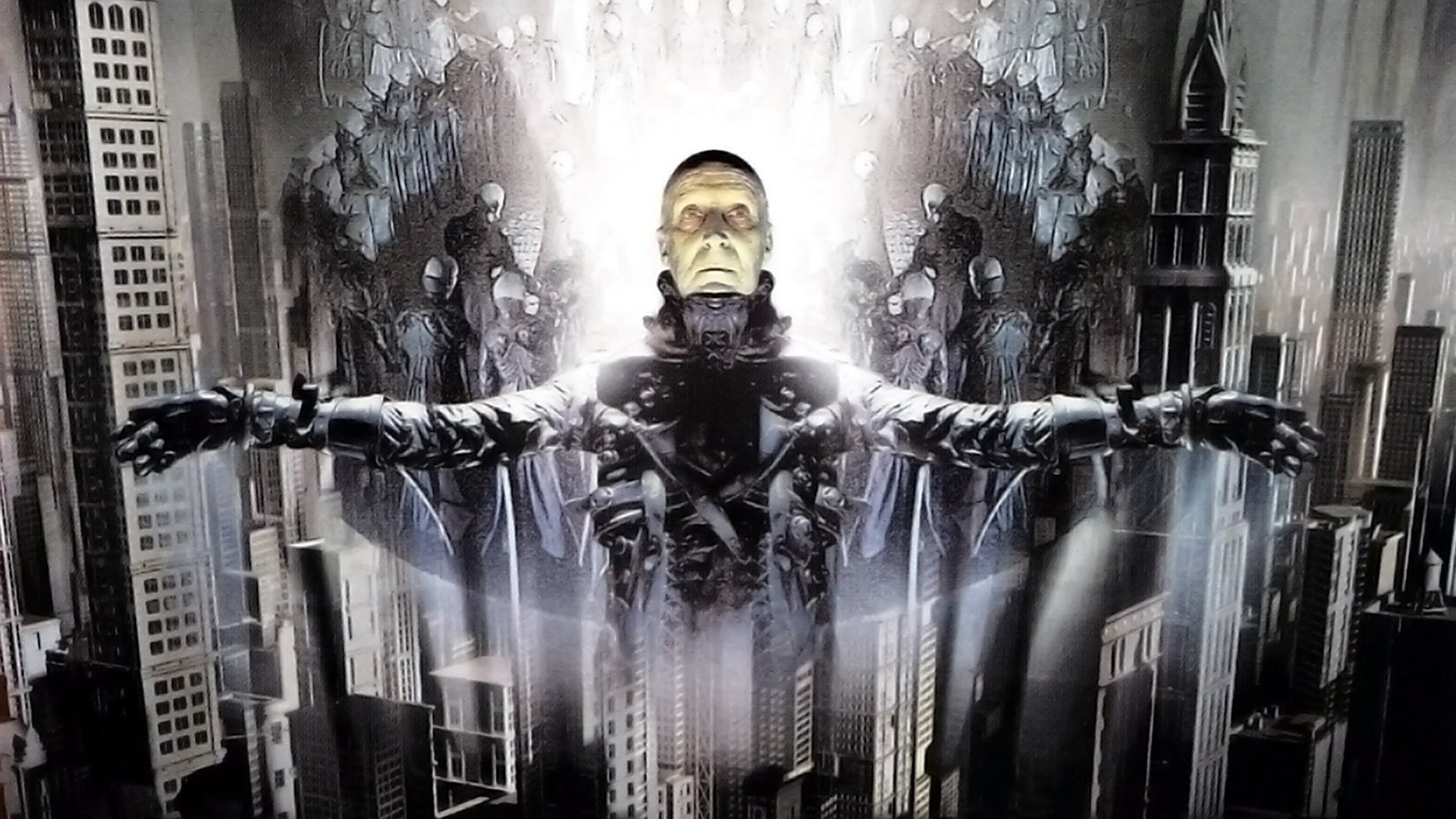
Alex Proyas’ noir-inflected sci-fi thriller is a fever dream for PKD fans. Diverse and multifaceted like Blade Runner, playing with pop philosophy like Dick’s 1969 masterpiece “Ubik” or the Matrix (see further down the list), Dark City takes existential angst and fractured imagination to the next level with alacrity and dark delight.
Set in an unnamed urban sprawl that frames an artful retro-future vibe, a vicious killer is on the loose. It could be John Murdoch (Rufus Sewell), our likeable but sadly unreliable narrator, but his imaginings and memory isn’t making much sense. As he tries to clear his name his trail is dogged by strange apocryphal figures, like Mr. Hand (Richard O’Brien), or mystery babe Anna (Jennifer Connelly), who used to be his wife, maybe, but now John’s not so sure.
Unfairly ignored during its wide release, Dark City has accrued a cult following ever since, and a director’s cut released on home video offers up more first-rate intrigue and Dickian motifs. An early champion of the film, Roger Ebert called the film “a great visionary achievement, so original and exciting, it stirred my imagination like Metropolis and 2001: A Space Odyssey.”
13. Open Your Eyes (1997)

Audacious, intelligent, and admirably perplexing, Alejandro Amenábar’s Open Your Eyes is a beautifully orchestrated psychological sci-fi thriller rarity. Co-written with his regular collaborator Mateo Gil, Amenábar’s brand of reality-questioning speculative fiction, existential angst, and mental agility recalls vintage Philip K. Dick (especially his acclaimed 1965 mindfuck masterpiece novel “The Three Stigmata of Palmer Eldritch” as well as 1969’s “Ubik”).
But don’t let the jigsaw puzzle predication dissuade you, Open Your Eyes is an ambitious smoke and mirrors game with a lot going for it –– much more than Cameron Crowe’s tepid Vanilla Sky (2001) remake suggests.
Unable to remember a murder he committed, wealthy young César (Eduardo Noriega), facially disfigured from a failed suicidal car crash, is in psychiatric lockup, tormented by flashbacks and confusing memories of his old flame, Sofía (Penélope Cruz, stunning). Madness, obsession, and verisimilitude weigh heavy on César, and on the audience by proxy, in this solid cinematic shocker, with a twist ending so unnerving you’ll probably want to see it twice.
12. Screamers (1995)
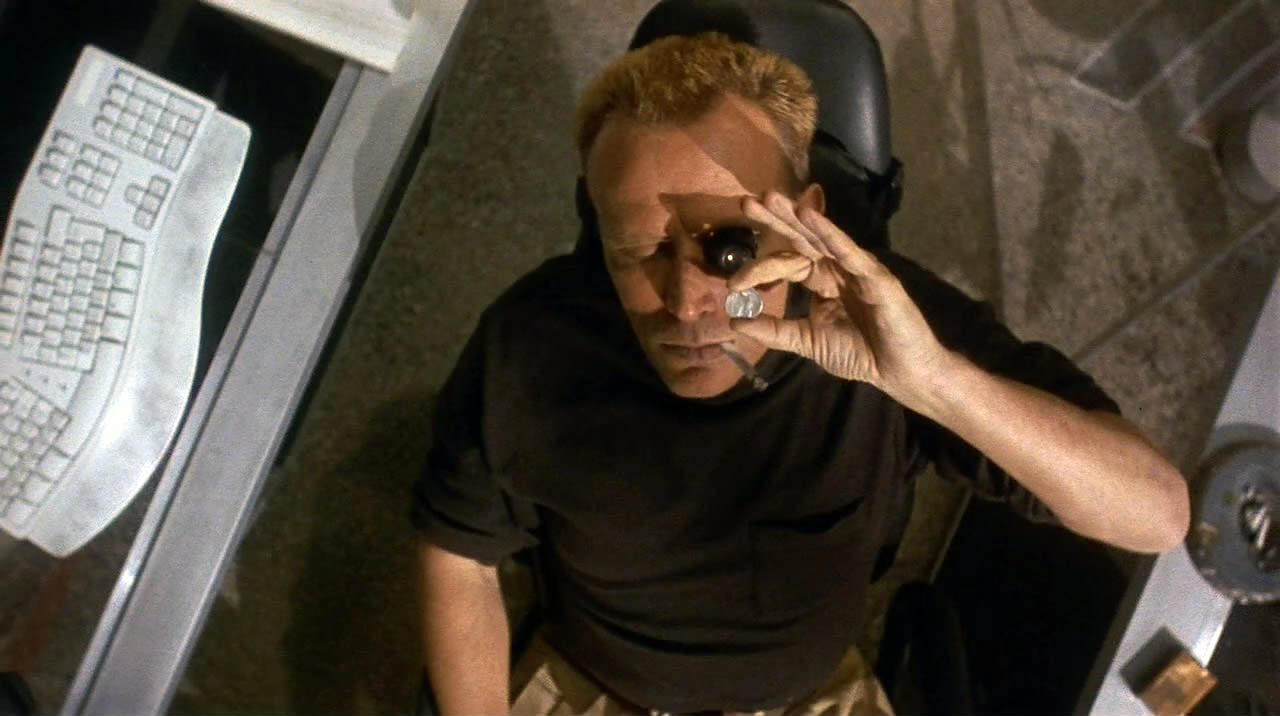
Reality and illusion come crashing in Christian Duguay dystopian Dick adaptation that uses the 1953 short story Second Variety as a jumping off point for the film, now considered something of a cult classic. Set in the year 2078, on the planet Sirius 6B where a civil war is brewing between a resistance group of colonists, dubbed the Alliance and the mega-conglomerate called the New Economic Block. In PKD’s story the setting was earth as a Cold War allegory.
The plot pushes in on the Alliance’s use of AI-assisted weaponry, called AMS (Autonomous Mobile Swords) but more popularly labelled “screamers” — for their high-pitched caterwauling when they strike — and the increasingly creepy, even beguiling, variations of these killing machines. It’s easy to imagine that Second Variety was an inspiration for James Cameron’s The Terminator, and Screamers messes around with similar motifs and meanings.
As Colonel Hendricksson of the Alliance, Peter Weller becomes increasingly more suspicious of his associates, the ever-adapting screamers can infiltrate ranks with ease, it seems, and, save for an abundance of action movie clichés and placeholder characters, Screamers is a subversive howl. While it may not be the most intelligent PKD adaptation, Screamers runs a gamut of guilty-pleasure schemes — intelligent characters act like idiots at almost every turn — recalling, at best, John Carpenter’s The Thing and Ridley Scott’s Alien, and at worst, a dozen lesser movies with the same premise.
11. eXistenZ (1999)
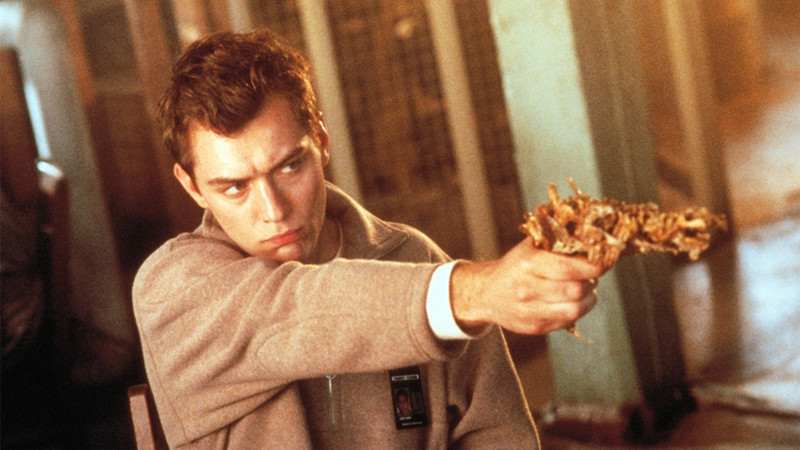
Often overshadowed by the similarly PKD-addled and likewise reality questioning sci-fi thriller The Matrix –– which was released just three weeks prior –– David Cronenberg’s mind-bending virtual-reality foray eXistenZ offers a similar cerebral satisfaction to the Wachowski’s action blockbuster and perhaps even more PKD influence (the “pink phone” Jude Law uses seems a direct nod to “VALIS”, for instance).
Set in a strange near future where video game aficionados have no problem getting bio-ports surgically implanted into their spines and regularly plug into organic gaming pods with alacrity, eXistenZ has aged incredibly well since it’s rather lacklustre debut.
Allegra Geller (Jennifer Jason Leigh) is a superstar game-designer for Antenna Research who is set to unveil her latest hit creation “eXistenZ” when she finds herself under attack by “realist” terrorists who are appalled by gaming culture’s “deforming of reality.” Add one Ted Pikul (Law), a security guard who’s easy on the eyes and assigned to protect Allegra.
Other highlights of this thoughtful and detailed sci-fi detour include Cronenberg’s trademark gooey-ness––particularly a “gristle gun”––and other assorted body horror goodies, and several satirical stabs at society that seem lifted almost directly from vintage PKD paperbacks (1963’s “The Game Players of Titan” and “The Days of Perky Pat” feel particularly alluded to).
This oft under-praised jewel is worth another look, particularly for those who wrote it off as derivative of the Matrix or didn’t fully grasp the Dickian allusions throughout.
10. The Matrix (1999)
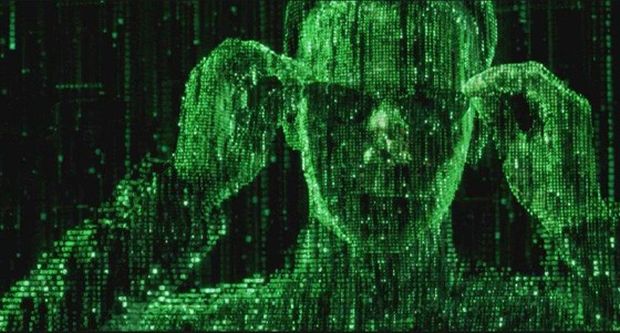
In a famed 1977 speech, Philip K. Dick famously sounded off on the existence of overlapping multitudinal realities that most people experience, what he coined a pragmatic “matrix world.” Well, it’s no secret that the Wachowski’s delight in PKD, their breakout film, The Matrix, and the subsequent films that followed in the series, display a cosmology where the known world is an information grid, steeped in PKD’s gnostic-inspired underpinnings, fully dressed with paranoia, sanity-questioning conspiracy and excitement.
When Neo (Keanu Reeves), a computer hacker, learns via mysterious rebels about the true nature of reality and his religious-like role in the war against the controllers — essentially Archons, godlike masters over an enslaved humanity — standard Dick elements erupt. Trinity (Carrie-Anne Moss), fits PKD’s dark-haired girl paradigm decorously; part femme fatale, part redeemer, and other cyberpunk conventions crop up, too.
The Matrix presents philosophical uncertainty that Dick would have delighted in, as questions he often weighed upon, from free will and identity to ever-shifting realities, making for genius-level genuflection.
9. Waking Life (2001)

With a surreal interface between live action and animation, Richard Linklater drives an emblematic stoner getaway car with Waking Life. Essentially a talky portmanteau picture obsessed with philosophical musings on the nature of reality, consciousness, the dreamworld, life’s meaning, and pragmatic tenets, the film artfully acknowledges Philip K. Dick again and again.
Linklater, a self-described “Dickhead,” has one particular sequence in Waking Life that is flat-out obeisance: Protagonist Wiley Wiggins, on a dream journey of discovery, encounters a man (played by Linklater) at a pinball machine, who, fearing he may be dead, shares this morbid design with him. Linklater offers Wiggins a lengthy response that recounts PKD’s 1970 novel, Flow My Tears, the Policeman Said, and some supremely baffling real-life phenomenon that haunted the author while writing it and for years afterwards.
It’s a riveting tale involving gob-smacking coincidences and theories about life as an illusion and more. It’s a lucid, and luminous conceit, paired with Linklater’s psychedelic rotoscoping — a technique that involves highly-stylized animation over top of digitally captured footage of the actors and environments — making for a truly singular cinematic experience, one flush with ideas that arc and eddy, turning in the mind like bright jewels.
8. The Incident (2014)
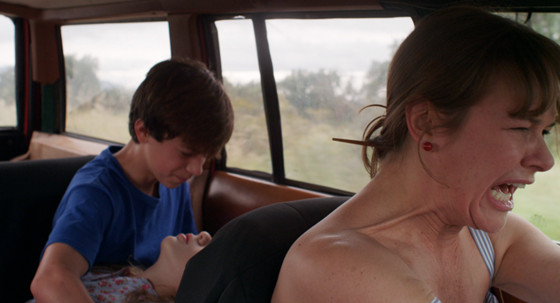
Mexico’s Isaac Ezban makes a startlingly assured directorial debut with The Incident, a time-twisting character-driven morality tale/adventure yarn that worships at the altar of PKD with equanimity and excitement.
Trapped in a Möbius strip-like stairwell, two brothers, Carlos and Oliver (Humberto Busto and Fernando Álvarez, both excellent), along with strong-arm detective Raúl (Raúl Méndez), gradually begin to realize that they’re in some sort mind-bending time loop. A similar imbroglio has befallen a family road trip where 10-year-old Roberto (Santiago Mendoza Cortes) could swear his parents keep driving down the same lonely strip of desert road.
Narratively speaking, The Incident takes a run of risks as a psychological sci-fi mystery, and Ezban’s resourcefulness as a writer/director is both arresting and resolute. As perplexing and almost fustian revelations arise, the story doesn’t falter and offers an excellent payoff. PKD’s 1958 surrealist novel Time Out of Joint — arguably his first real masterpiece — is explicitly and repeatedly shown, the relevance of which will not be lost on fans.
This engrossing, good-looking film is quite an achievement, both shrewd and deeply felt. Rarely has the psychological and emotional strains of time travel been this accrued and investigated, making The Incident a small-scale stroke of genius.